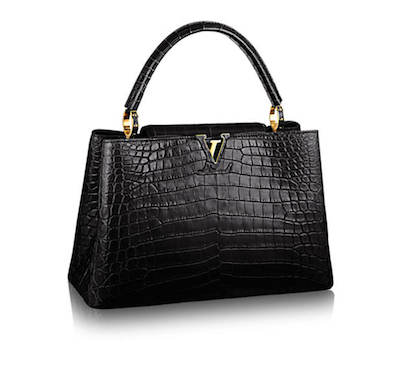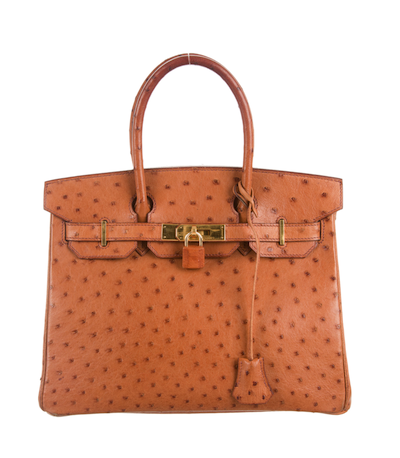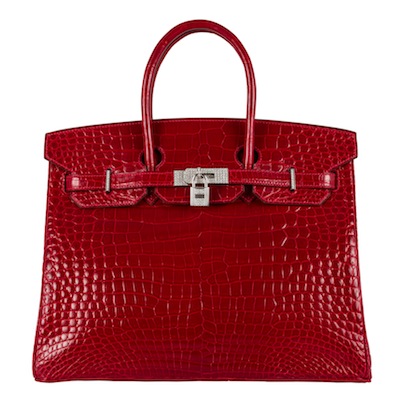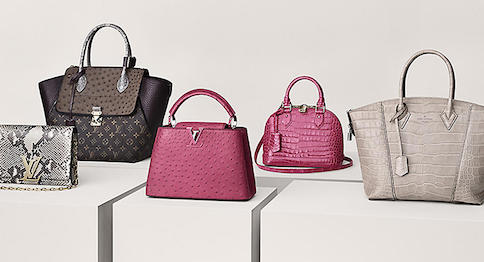In opposition to its use of exotic leathers, the People for the Ethical Treatment of Animals has purchased stock in French luxury conglomerate Moët Hennessy Louis Vuitton.
PETA’s decision to buy stock in LVMH comes after it the animal rights organization released a film exposé on the cruelty inflicted on crocodiles to harvest their skins for leather goods such as handbags and footwear. Through its stake holding, PETA hopes that it can push LVMH to end exotic-skin sales from within the corporation.
"This announcement is symbolic, an appeal to attention in a year where the world's events -- Brexit, the transition of the United States presidency and Russian interference, banking failures in Italy -- are capturing the already strained attention of luxury executive and clients," said Marie Driscoll, principal, Driscoll Advisors.
"Someone has to speak up for the crocodiles; thank you PETA," she said.
Ms. Driscoll is not affiliated with LVMH or PETA, but agreed to comment as an industry expert.
Animals are not ours to wear, says PETA
PETA’s film exposé investigated a number of crocodile farms in Vietnam. Two of the farms visited, at one time, supplied skins to a tannery owned by LVMH, the parent of brands such as its flagship Louis Vuitton, Dior and many others.
During its investigation, PETA found crocodiles lying motionless in small, concrete cells. Many of the cells were too small for the animals’ bodies.
The farms kept the crocodiles in the cells for 15 months prior to being slaughtered.
At another farm, crocodiles were jammed by the dozen in barren pits and at another the reptiles were cruelly killed by ramming metal rods down their spines. PETA also filmed a crocodile still moving after it had been skinned (see story).
Responding to PETA's report, LVMH issued a statement, saying, "The information that PETA has sent out about the LVMH group's relations with crocodile farms in Vietnam is incorrect. The LVMH group and its suppliers ceased all trading in 2014 with the farms named by PETA.
"The practices described by PETA are in total contradiction to the principles and rules of the LVMH group. PETA was informed of all these elements before broadcasting its video."
Despite LVMH no longer working with the Vietnamese farms shown in the film, the exposé has placed a spotlight on the conglomerate’s sourcing and has brought up questions of ethics at a time when consumers are buying more consciously than ever before.

Louis Vuitton's Capucines MM in crocodile leather retails for $48,500
As of press time, PETA’s crocodile exposé has been viewed more than 30 million times.
Hoping to persuade LVMH to halt exotic-skin manufacturing, PETA purchased stock in the conglomerate on Jan. 12.
By becoming a shareholder of LVMH on the Euronext Paris stock exchange, PETA plans to pressure the the group from within to end the selling of bags and other merchandise made from exotic skins such as crocodile, python and ostrich leathers.
“Every PETA exposé of the exotic-skins industry has found that sensitive living beings are crammed into filthy pits and hacked apart while still alive,” said Ingrid Newkirk, president of PETA, in a statement.
“From street demonstrations to the boardroom, PETA will push LVMH to stop selling bags, watchbands and shoes made from a reptile's skin,” she said.
PETA also finds fault in brands using ostriches for leather.
Prior to the December crocodile exposé, PETA singled Italy’s Prada and France’s Hermès for the unethical treatment of ostriches.
Ostrich leather, an exotic skin known for its polka dot pattern where the bird’s feathers once grew, is commonly used by leather goods brands. PETA’s investigative report, posted to YouTube, shows the mistreatment of ostriches for the benefit of luxury brands.

Hermès Birkin bag in ostrich leather
PETA’s “Ostriches killed for Hermès, Prada Bags” calls out these two brands despite other well-known leather goods brands also using the material.
Nevertheless, the nearly six-minute video shows scenes of ostriches being plucked, electrocuted and exsanguinated while conscious. Scenes of the brutal treatment of these birds is juxtaposed with footage of ostriches in the wild (see story).
For the love of animals
Similar to its LVMH investigation, PETA has targeted Hermès and its use of reptile skins.
In July 2015, Hermès faced continued pressure from PETA following the activist organization’s allegations of mistreatment of alligators and crocodiles that eventually become its handbags and watches.
After PETA released video footage of farms that it linked to the brand, Hermès issued a statement to press, but remained quiet on social media even in the face of hundreds of negative comments.
The film follows two anonymous guides through farms in Zimbabwe and Texas that supposedly supply Hermès with skins, with these workers providing a rundown of the conditions the animals are raised in, which they say includes life in crowded concrete pits or dirty pools.

Hermès Birkin Bag in red crocodile leather
This film also showed footage of the process used to kill the animals, which allegedly includes repetitive shots from a bolt gun or being cut while they are still able to feel pain (see story).
As it did with LVMH, PETA purchased stock in Hermès due to its use of exotic animal skins.
According to The Street, PETA reached the one-year threshold of a Hermès shareholder in July, and will be able to submit a shareholder resolution this coming spring.
PETA has purchased stock in a number of companies it finds fault in, including Air Services Transport Group, Groupon and SeaWorld all for animal rights infractions such as transporting primates to laboratories, promoting circuses and forced-performances in captivity.
"LVMH has a strong record of social responsibility and community engagement," Ms. Driscoll said. "This issue was resolved years ago.
"Media and publicity can exert pressure toward right behavior, but LVMH gives far more than mere 'lip service' to ethical concerns," she said. "As a shareholder, PETA has a small, but mostly inaudible voice at the table."
{"ct":"YsemIE7buVpmIuaHgfUXjckAYcSJC6OfqpvtNFUJ1BOia97FUqkTLRME0PCSrdnsyohFIBc1ac\/9ahEQNvWhP\/tw3Ji3O2IMdJJ3UPkqqPvGlMGecQnCo9C0rvHbtX4gCRa0aUBnmZz8PhClTR4lpm73VZBPhYhh2P+b4jT0nj\/zubogHfG3Jm\/jOe6o6ziihrzIlJ6cQVDMyTV5FVDY\/88+vIvJjl4BmM\/9\/Mg+qJmswdg0visOvQQLgOuYKwkLEIVoXGbCAeagRCAMCPhLQQQGtu1j2kQCvfui5uJRqddozDTftNXLGR3MyVYf\/GVOYrB9rVbvaAfYLIsmYqkmZZaX68q+elb8JFHv83g9s+zjgzntNURi5TGJOwYazs2gvFypQOFa+HEGE5W9L4h6dfewSvGSUF9VOERfk+0qgQn3flpkYY2wynyILwolscFeYolvqqNjWIXvwYLqGUxLQTyklDFVrK+OMvQWVMJuLaajY2wBN+lvUkahemYLj0DMqJzCRDclVvDf5JrEe3xl5TKEGYXdn6QQhoB\/BSUxX\/OTy0KUQ9KJuUY+hCwYW14mixNFvASwNrh9+UmpyCA8fNjy9FnUUOh+1IHv7BVlCkjCrlefN9+5yHC8e9DfOsLZgCYdvans88dTDPVxHXRwPiInGJLXjElMlI40Gtnj7OIlSJme+MEm7y3JrXMoTEE1mApTE3NrnNAtDmeV0tQGU6S9Iu7SDPxAch9BntbzROUo8PVykI9mysopLj4UaXa+NEahQqozJW5HijD8NWZWWp46hUrWErkJQAnbG1VZfGMdCztrTTQsrWeQl+OH1JqFiY1VRNHyHLwEXtLCtNOe4x3T0QiMQO58vgHUQVtsR1O2fchzbACh\/VdDV3VRlo3FsQ7qCgVHRfmZUhI5k\/C+ArJ+Iz8i7oVqHXUlvdJqOXdQDKoT\/zvCr1C6XnEga7Vnz+ZMaSl\/LELxtA56UQDCoMwu7mYCq+OPiGencFWzbEyu+Ra\/rskdlnA1NGkBW04O2ktSoIgYvCOdyapIKpNMqk7kuFeWtZ9o4aJtdn++jRP6AyFYO5sXQlQXRw\/Y6OIr922dHcHxbrZ\/4IzmtBXvVfidu1MtRKm4aOQ96BbnaJf1\/68Vy6jcFqaBxPprFuCiLricCxBkdPIUy0dPDd0e2ojV28015ySiAOJmLOuu5lkNb758kIZdGmQfaIrRD6twgt8bxr\/bZtYw\/djRizYergyiP0PW6ynNl+pjNj8RK2GrHtfxhfSh5irSTle5HTmo8L30o5++HDfSfi+Na5IoBKXI\/FBn9WAfnqajjLWxmcjYCpgSo9gslz1rtN1nd5iYYTn\/KGjrOfFcNi5KPk7DafDK49ji\/zqbV9qVDDRRyYe0D7BDwnhDjlcBOc2ruTS5sF\/4Z3+ABV6yk5KcezUxcvWGmNhT\/3EhPm5V0TQNQ3699labrvnM+yKHQJXhtT9+wprY8M8KlW+nIyjwG8pDL9BmWFIi25ape4yv2RGQgigb0Ovm6\/ZjbhPIcDHMCRGeXtgV6xix4egcbP6NdPn4dxd5vxJD2zoH+MsdoNc\/pAHlemOZqB6Ox884mOOnvRZ4aDBMmMbNVvRZZkPQHhvO22JPw\/e329bZKehYCR8r35R8rSWevD2JA8Y+EGsp47aY5yOUHyOAk+gg8Hh34W8KaiaK6qbpdSxRQf7IhnTs7V4to9MOP3Erzr9rpa\/72pWpRBf2in0xVFvTGunsIENFAkgq03y4WhgGBfRsulrNTzxvyeeudvkUhPx\/7ocZgGCOUyIK0w3EUfrh67V6E6GUVVyQeCxphxXYDzSurfF01TIC66E7gB5N\/ghV+MsBQu27hbZJcyDeGjpberAVY5GfhHhcXwzZ1m+HRPS5f\/hh7Oajzf0OrICJ1r4x2Em4J9JdwzhcBwQgczAfJs+edL90TL1V5EzFPHM9W05dikbHVe8DD8HI9DhbW3mdAOz0hxRfr\/gwm9JINP6c5Mq4r+HSiKb1EgkU4RddXfnMKNdy1+sttPjI2OKeI5QGBQmDWzhqFVDZNm+slVSLtMkE+ZPYDF5qMX8zJLYvpZqGpm5ENNoOW1IgDiYffaO\/k4Hm8QH6q1A3HWnBcifNYxuEwPqWvOKW\/21U2Tge8noL8mb6sOT\/Xua1jkzVXuLs1eJd0+Vs\/Nms0i7PUpCdsBqEFeKq0OIrtsaaKCHhFC2IW4fPetGKQz54331NwhxXBq65w2laBGsRX5IHBCMRAt19Bh6MNQmKdBHCcpAiuU5gZK4+G9VZFuwOcK5t0rSdc3idIWiq5wLftpasCKRlX3Ctx8N5OWnqKnLaQ6baKbC9GZN8oY06zhL\/XqqW+A6rmrWRZA+p+lAMHrS9D4Qp5yXfiX5j2RYkV+1zzWr6AWXabDZda4VwXMxdmiH03lu6GoTtI1dWiIELb4RqqoupY6hgdC2\/\/x6v+yiwb0K\/0LVoHFEA+TKhIBZgPsw3LW3C12FAO0Y9ZJDSk25kZnJA+gaP9fkiTDgvi89mtUPDKdKxZUog6aKqufNTCgxgbCzmo8Hkj9\/fsb4pTj294pSfxuLamrdkklRqQGfdLCJ1JiSkvFqm9U1oR6kKbaFxQealWo6cwgWWm4ibqKqYv7pNsGtpTCm6uKFSiR4aqRWv9jeT0cuR1ajgSMDtI8Z6S2cjV7Qye90Ki0dB\/Y0\/T7hPqRYFl1gHF7g2uVGYDf4v+2JLvmZJDiGMVIEPT1ypRWYGi6kcMwH2ZI9OXU19Ec+f3vtFQAkPNd1YbvT4Zbrb2efmrp78Cdd\/aqT5n4pBmalfyHkF7fGqH39AOKokE+WLLvSGXzuf3YAmor1GEccvwE1y2egfZqAPkc4HTrECw\/DbRTzDWwyLMNM7nAzG5uqYXy6z5nvjJfE6y09sliycgWq9MntzkAFidViKB2+R1HPNDVey0QTW9PPhcjTf7A9QUmZEi7ixTPG64Ryl9lFdOUm1rlTEDACzFiENJT6mYh0WarDAiDhy+p3yA6LfbGw2HHrzqqWIW2LEyp6xljOjfs2o9WZvbeKVHDg6JRdCP6730MRRoJzOF5z6PsgKA+UvySbkL3DVK4STIbLiAMrCvE0zorMThsKhgHBw6k7\/ZS\/+lsKtj1pFes3FnQ6ANMgwCJ1Tu7XPt7\/HlIR9GQ26YkuSW7\/5zoVCVqSprSHVfNtsQWDo4RCZxVYyEfUabdhCN6RzLNalJMr4kz3VxQAL9F3VRMRiFppJBh0JsaL38ndSSAQz35TcMoPXwJ9YOsnlc0FsWm\/LyeM04UEuBACz44QXYkGxjgAWpcezoeiOtp9EwoTqCk182bUWly6pxby55FAM6GrlHuI63iu1Y\/16ODzJNi3Z+iWYJVL23Ars5Q2Ln7mlymHzKHzRIuneSxY0w4nVzyNwvd+VCJjQuq7oufJvtgQ0SKZh6fvbjYk7gfRhjNMFQAA6dOKRIhBokK2eXSsoWemlEAET2JvjMtgbtVBPS\/ir1QyrLL7ie0X1NdTr8fTQAvxyeS0MtgSeDhGpq9bapN\/kowZtiYfb2X21KCCGJgV+KoRCQb2UXUkwMbinP2aaduhTYizR\/dgdCvuSXAF8ITrnjMhCOzrOzgtd2zosP5jyLBTuq4Xiuv1s+UqwM0mHNVugmKj3sdMVCHWZ6PqsDjSYoU+waoh7lS4k4\/ILZm61FuIFxwVWyKoew2UdpjbxPrYTO9DiRJmbt1J7oTYqPwaEF5MuQ0d5sojDEUrEp0eKuyBrGh1CTPY0zkf+GrEr5UCfGC00kjwI9ZG9sslcwYS\/iGRn1pmhDgRfGAtqTFiYeKvghnRjC69qtk3eGr75jMZP1uJHyuhEOU\/ByXXEPOcp\/1OPjkh4\/ugyWpQH8S6Gtjv0xov74xZ\/VaFJSHjCxFNnqHszWCTIE0\/Gwco2osuYlv9MCcurxBmUS6jCCfhHwQ\/mtleIAW7BkYbywCDSSCprrgYYxckigtbD0AFSCiTEptar80VVzfG3+gRNZt26YXQKJs+dRXVmgw\/zZ\/Vz3eNRBu4NkGto+B2yuBn5uGemxq8i63vd\/LpuWMZesYjqH4pvNZceDSGnYHMRWY+3FKOrCs\/166Ul6XRS77k+avAtIF7m8ORb\/qzn93Ba9jUvQVp5HfCiMk3SPQk0hnIFYvv174x58+jLbVIxjQ+JiXkgpVWsRQrSopkYm+CbId3H5a26uotLYiOWc8X\/vVygPswP7KsEDo0XHMzoL\/jXnNtI2k8ZJgA56hjPXB6EaNUgLLkufyF+7LDAMe0kTb4UXqJT7SGShXMVkiAejzvZOzXxwLbZsN6dEVOqEqI6LHMHfl3QIyfh1BGv48Aj97A\/cbFy8gbkKIUWhpu7Y4zlwWuKs3z7N5UDZmswv3iHHPmCHXiWhPN9zAsX3SNCC6CSajReXUgu9MdyFtPV4s6emMpJgriW6C0Ed8pIh2KfNVe8vXuEnxeh\/RNl5Is17joui+jfVhbGgAN6RW\/fb3T\/ez1ykBwpB4DLSfPYNuBepC93x18L21fsqeqee\/zndJedEAZzKRGmtWAGEQvUsesM6v12eelnP0c1oO1KUOITR9kKbd0Eti78cUvI4Aq3ioL56vgA\/idWeRqccHniIslIxCTeYXSiJdnghVDrtUOsSt+bJqIgSJWH0VNvKRjAmRBA5d1NbHa0Xz8LSggnwx+b1uaOz4Nlf25+dwMUaYXT03aWoM1FM8+YykOPwfJr5+q5hibOdCDI9685N8bUGOZTzHq923M1frgjC9eVjxJ0WQuzmdLo3tF4jjkrSIBgBZ0gQtvyhzIAG\/r0MfCIz9otXIGpw8VcV58TDx5LBKIcnn2VZaZdz64F0K0dchyWcHPjPlrHOJLNTwZpuSqwc+MGzbmzxErimdikPjlsFo61xjOx2bPgtq3gExvwyKVwUlCD5l+P2v4ROZIar1wLiPHwSWD5LNJ1c2ZiGcVoTfSlHcehKVAk1kynUM58UaZOCqqgFM5p3ACioW5ZpluI0QbCrOg2OuriCwTYqh\/kwAibts1Izkjy1PP721AZ4kVkA\/\/b2xEBEpbp4L2hfCuiRm5p+c0+StGg0X4RR0qZHIJ6hjC1l4w5j8yrQpjrntHRoVZ6BgrihwlE\/HaVP6E1POuGRakpX1nHC7x\/UCHmlC0bT1eSkBTDSTyEGIBAHoYipgYoiZ\/SNz5+2PegXN0oo8kmQ1P3oQpikMFfFhb3tmBDFGiR4DfJRg9dWwIWwF2iulP9dWfrO0TPO5M9lJHWnaTLM2n86Q5rWKEPQV1gAKWBkQofvorP1kvRb54INABVeocaZ\/FAAGXyLR1MwzArl9RKGw+vl281WiwSb3NiH7SWuBFI1ZMmPLUV5EkGHPUQ7BjsaZAtUOzi6CnuNYETlTwd1SE8M7B6WscBHQjIjkTOIKUYkOs2UkJ7kLGk36TktAkpYOBwL+BcKY0vciCmg5MziZ\/4hvQKINMxfOSPuAFGq4HL13p1A2HX2Rz9e2Ekdx8XHbm1E5uZIrWDIqH\/zNn\/ROa7xaI\/6epO+wLTXXajI9c+0f2GFwOk+t6BloDVXNVuaksMN0xg70094ZCXQzLbgELe2if6wKQZiB5o8RakJnai\/qkW1CA1m2xkegYoGmLO4Xs4dlFvjXCXrKyKjX7a\/fzTS0v+bZwdDujFplhBl7sl6pz1lqlo2tyEZik9ZxloXPnJzuLAcgLGHF7GbzG9cARIYRNNsnrUl50T1vQepbPkF08i9yh+bTLHBO0AMOPOJ67YxCRKtqvacP0z1wB8QuDBsXFhS54gqpimxPP1CwHUraWwWOTv9DJst76NoIRte1WKEGMD7JIo0yQM1t5ZktB01LbLhGC8TjZpmXTQFBZFV7pRnCSCGoWJ6Nrun\/JQJGT7Gzs81cvSqCZBCp7QcVrHxECfWHw2pcGoLBco5FuJ4BW2P\/zTui8KJKJuWLbT\/Gyqu640MSS0emcrqc0gZdlXOsZ3lReGNZVtEv7HfZ8xGiS0KQaZluM1YUY8eN2oEs9sdfdFCTJ9EIgyRdkEnuHxl3DsyKnGBafNdyeaATVgBy5Est7wFa2CquqOxbQtdsGTomGMdiSouMKmwGgi0EHqzdWRP3C71i4+m2tEYOOTEf2++793EiJBNDiz4MBjTJ2m2TUWv51NGMb5gQ\/kgoOjT3zFOvJtDThW+a3T3\/+XFToAlOre0802Jsh\/4AB5nH2AZYZZhGFSqtrbNihUTXNPHMdAjVXIni0KeFQCHAG7Q8SSQKtN4cFAOLEL+u7PaNlk3B9Nln4uJjnL8ZZb2eJSn\/565YcH2OiTh\/UvH4uL+zlW1QwrOYgISz8qjAIjbQWRF\/y+FzIhZAvaGrCsxw5xUV\/wUlqGtLjWtgwaXRmFZ36QS8Vj\/CjkrJI0pW\/SFGe0UI7R9rZ4eQYjvoVyIuj+xcLlxQav6rXmxQk4nf4VISfpRbd4jqkrVrHI8duLlPZv0BI9rnwCb6mybdlHOHxcnkWBTDKBJyqiJWwowkrICaw\/bEbovWPBGm\/JCjOlqGqAwM+QL5cVLFfRUlALFyo2R6Ua\/PoMwQb\/4naLh41QrSOqZMPj84QcQgZRFKy42buT2Y0cqQMUQ4TptWBhOG3bIZcHzR2rXRnjwfSqyfWO+QQschpq9gejnfxSESzB5Bn7M7BRa2rNt8JgzEcicF6Qms1BSWKyePpc1BLsDjDely7WPLpqvyoWz9o5NxF0EOIsfg4r3LagpnovKvjx3lTUol1zPp38HP1H28XCUvQH7rWfi4ZBCodaE4JrUbCcnKuFJo4uzBFEt8qVkqLMG7rC0S3rt\/vRR3jFSeX8Z8uFwDRaooLOwG1dz+eVuEJ0Xrniis5OQpTp7k9mTLpgw0cn9TdYS\/vaQadI10X1OBMvTA5siKp5myATGuvZEDGkqqJC4o9rs+hloOhSZ62fzr6kYoH+p7oPQl\/it5pqYAkhn\/Yuv8Kwdmu46NJT4IfKp8jtZeXzNcjeWnhtdwDYN7GbIuGTfd1Pfge190biQGB8XM\/Ug4yHClw46x7+2yyjmnm7INE5gTEYb1jiDYqhZ6DruzDYwJIh\/Zj3Hj8MdjcQq+j\/bRUUzeK2F5stRg4GYJ2oew0k3JPlvFDJd9wzO4MA0tmrhxF8w3S0bUdsBHKw\/kP5wg\/cyiMZbiedwoj9szWeW8apeMIcSCLr42PKFmKrL1O0NZ\/rM5RvvuULI3U3vFWNEb+Vqq9qVsZOhlUe56ZrYiMEuGoAqKmoM1nS9MTBHY02SHS76P25KK1b8ujTGlcdjrSDkzyIh1MGnOTN9Uh+YfLLcfaOHbBKoa2hfCHln3Epo9kRNfqz6DZWzBIvKZjyCP1E9ZGCIQ13ICD+fxnJ4x\/DFR0Qnm2tYRUy\/xIGWMX9N6OmI72pv6I\/QAC8mwatvq7VdwmsgoOfybsaQdfwmHAUv9N8RIsxI5HMp61LY5xmvHi6TzfD2g4V\/kcQc59gGDpXiMHzk5r86t5wGtccY2IiW\/iv4X955f2EggaL5PjrUhKR21EekTBoQzblr4cfPNTQPQ5a2vmnXPe76RtOnTLyMcBX+aCMWDeuQPol\/OPDTuL8qdop1cVWNVZOse3Nfbxbo6sze2s5CbyKwZY37IfkBW42\/UmswJiuDOPmcbJkSByoMJ4Yx2fGZCgbOpjs2cHouMK3AJIKgFuRPiTLCXQRMhIG+M5zKAtu+6So7sdIS47L+G\/xTWC0VXKm1H\/zknogbCDxEVB1UXhzJEXN78502xs\/vCkPfxJoJS5yE1\/5XvUpm8h+nF\/yAXR0P483HleNf5qGMkRNFnkt7xmKp6EAjjAjHY06YCDCGtcC7pMnEWj1Uwtn2smgE5t4bOgtIIf0ygKphObFxRRQ1RgzWnXIPXWppuEv6v0ZW9O3NwqQvDgAaWvtk6naEh21dc1ChgXpjVK\/16gQxzKCSQCAoJvgeHYThfci49pnc2MQ\/RTb21G\/jsqC5NbR+dBWk02IUFAKR\/3KmzZfiIP1XCw+0a5CwoMVz1a5kx2GQJFn9MWr1\/cfeZeEtf1D1Is+TU7qgE4zrR3X0KJt4qHwUcXXkNlapGckpgrM9jRM5dKENpHDQfjHloOFBoAH9bcvwIjfQ65yRAuW8dDf97F+jpdrbpY2w9So2RIlYN7jW04qXN1sod\/UgMwe0SJeG29Vt9gRjDUtfUztWGQiUgAC3YVsz3pgoa3cWrny\/P0bGUlnVvvybNsEKp6mFk1MNfQ4p0to0A068ER7xUF13G7iF9Y+gQQRwHwHc9UOCx26hXIbDfBay4ZRZR6KY5PHpy21qQbWASkeytGR32ll21YjH1r4XP4kXeIWSInPTRIb+m8rz\/ABW30735guY+Ug2hQPlZYxDhqSdEPvdJSZKGPuCXriu9GKDnLJzXMFxHSjYMbsuLSTJ05X6L7o9gYbgRcOJy\/qBYjnWwM\/UL4hDq3XLTXfD03UP587U3Byojlw0v\/kLayEhXKbWAGRDpH3k9NjgYKGPc2zNf+xhZnd5eaKaWVDhqq9FbjSmEXXcDzGRJwg0QXdtFzJChd5Z\/E7eV6LF0OpoX\/gX5k\/jChdxlFxLFyGc7\/jaz5SoRjGcK2f9m+3Ad6FFC6fXyRRP8nZJCEw8ubKXfiLNLxRawcWF3iyeTstqD8Gl4l1XGBJ2aw+S6N1l5caotfmNBZ6W6pcs0rU46QZYDjbyNcKUZ01wBEaY4T50\/rtSQHqMTEk9prnkaZ2GK3AVmBEEE8O46Z1WvR3aTYOwyTG1qDASalGgwNRUxmjBqVF\/0JgQwjHR0+640MqK4bcFe70yylf11ejodUE6PEq30hElpgeSBCKVcLptNRubN9qSZI1WJA\/BQqs8QMuGgLPKn7sW2ZWdsnziGlOI2OQ3KwmxdB9yv3h0Hj+HUU4ef7Ol2tc1dAl\/\/1lcKvLZdZy4vCytcBsXoPY2kfQXLKvKB2Ko72s0aExeZOPsFmWuAt1mRdEvfs2JSZ+\/v3bLl8dvfb3QFwRqfkS\/V3lnHRN8JOLjtfQRsq9OFuDKI+7FCjbcDPeQyie0ZB4rV+aExO8W4br9BDRh9rYil4C14q71lZVkxIH2\/LiRbJRF4rHEyAeXheOev0wYeuzgtb0h6xZj0K4vA7W+ezLII2gmSUjEj+8t8z2kr3ZMIzO2E8oaEj9gUFB\/wk8zIxxsnkULq\/vMfN1N4w55DMmjZkttGK\/RfgflhgQ0LJof+fTGpa\/I1zudo\/NuanvHWDeW3HYLdCEBGLi03BSK1UEfn8tV4NworKrTm+dmaht68aQZmcrDsHzBMnT+VSxEj7n7Crb0aQE\/P1AcBn+OBS\/AX4ffUlJuxER8Fkb1js4B2ZTfiJGt58z5RH+MsJxnOXl3NBftdyz9yLf2YsqOPKWQneV72yeFT\/BvBpjInumCPgSls4zhuUQtnVXGjLxvWqqjiOEcY2v6NV6ZphXZCVJfH817LAiUyXQ0spDYHh7ks4\/G7UqYB48RvAOLAgJM0oU4dlT9IWC8wlC+bwtcioRndN09iAXPnOI6ZNdQ0\/9qdms+6fBEDZ7g0p4cg9E6JJkbxr2kWUPMqyCgmRPbPmT3ntDg9TW1SsMXPHqy33sUsdt8WzeH5jzqu6pnaIu9DzkofwElAdN3+ATgaKUp\/GYi4v4lUtQMov+4qvRT\/Blfpag6w8d8Votx+dkxErTZAaER4\/cKh55XFW8JEpzr9sCmVHb\/WOpYRX6NqD0R\/\/hnyw2nrJHcs\/Apu0uswrS0wyFU1Qj\/WFGYqIX5WEU7hYLcrNf49sdOf1JdrIR226yDE3BXlPzZ4alysiOKKJWDFhqhPR2Y48zKoLri909nGJeQTpBh6g58iePtmCCnAVlY6oINs4UNoomga1uzOjouY9Edn\/ToODVeWFVWTbmOlD8VJ9kDb0uKK1Jg4wZDCDQA00HLEOE3xtxYfqBmrnyrb1hmao\/0TXaWCnXzFE6S2HQ7yZoc8xL3dU1dudSjqZGkZE82CMY7rbi\/pPD4+4bCOXpCIguJs9hRfuuKKwPFrZyN6tFwP1IwT7M0x9gzY31eylBdr2RtsISrKH6\/zoKU4Fg\/l1dG70ejiuBFtKfxo8N83CH8GI3zolg8FFFOt\/18KfgHOagOEGb8aw+rLhb9xINVPen+8NCkpE0zNs1rPOMIQSS2CRGJEjiopbBapNLicLQKMPyvqJi1NS+w\/if3PpK9gjBAhwazqNgXaZjiiesZkzYWMITfv8oFHEir0cyUS\/FRQjJ80sPExKYntRjdcBJbIaQEBlPOuTwOz7lWb0Ba7sXmAy5V0hrrSzRrcOygF7f3ee4MMPYcbdpj6qszVAzW63ySg2cswwvInwlnVwDAZxea3Ll7mnSI6iXFqw4yWzha4i16toTPb0AbXsx+7lUN\/OOfB8NzExHJjcp28bdgSQWR+w2r6PayeQlFrssywx3FNSuyyKl\/C991MkANharuRiIFKSNwwbXCuXIc\/7\/dTp3ainylM9p\/zUQxdJYWAsktGfk9dYpw3DXIgv2stuUDlM5JlB+6okWCO+MGkK5FiqaYdL6r+eb0KqbxnO8nl7eeRvRcK0MbSYqYhhl0CwqmIZltL1ZGlRh8WqzkbmM20jCCaukN2vci2ACpShulXqw8wx6zqDd5WAWOEwKj406EsvWYkR+Qgks9FIIpWUGYfzevi++2Yie2jLDObrfOdT5t6LKgIx4W33KczBQigAP2Rf6\/Jpem0e9Hvch2OVI+jynkzkdOu1ob5Q+TjA3+U5PpMml\/hJTXPncSjsobK3hHiv0p6OfijlN1WbhE66TYNgbZiBYob8ebfkrx\/unzFCwARecfJguq72RlKY1iZJ+gwqP6bLcT9ViMSo6Xfdq9L\/ehGON+RumN8eo9YdkfNPZ7\/4rnz3k7d42\/FkJzFHEWZe\/MRtOJrCIvItydcnfuo9+ULwWh0Us3FaQKOiC3Z2fQwzhBuzBpv1kP0xZ9bAeJM+5oarHJNqm+gmwr9m3STVgT1XllkzMEfFASA7AOdYp3p\/18TPbtzqVPLdtL2py0Y0V46Xq2Uzt1yLyeC\/IngGkTEj+2hp4ZLqhchLaWPgK8NkpO9mPrzlF1Uq9+GpLcRIfB0dBAhtAr11Skt0gMrV8mfG2zZzjbNoFE4e77MW54OxWXHlgt9bdOkMNKv6k99e6jBJ6rdCbTKG2Pef8LV4Jg1QjBGnb7ve\/\/P+Dfi9ePB6vKBRW8TOA\/8rXrUjRhCTNiP2x0KCH8C+G1WhnezT3RS8wxi086ElxE7ximP1pjbDklXyjNuVYbcP4x5nne1jruLNnQ4+9I0ZWn5FbiCTeX5a4rnsBDbPFuQA4uGTPGj0GrJ6D0+pR4GcqTQhwr490jkfLgpVlIbowRiGSL65HwhhR7xKLclOweYrLW5F\/L6ju","iv":"e7bf07d35f634a8852203ae979f56e86","s":"490226080b677c8b"}

 Louis Vuitton's Rare and Exceptional handbags in exotic skins
Louis Vuitton's Rare and Exceptional handbags in exotic skins